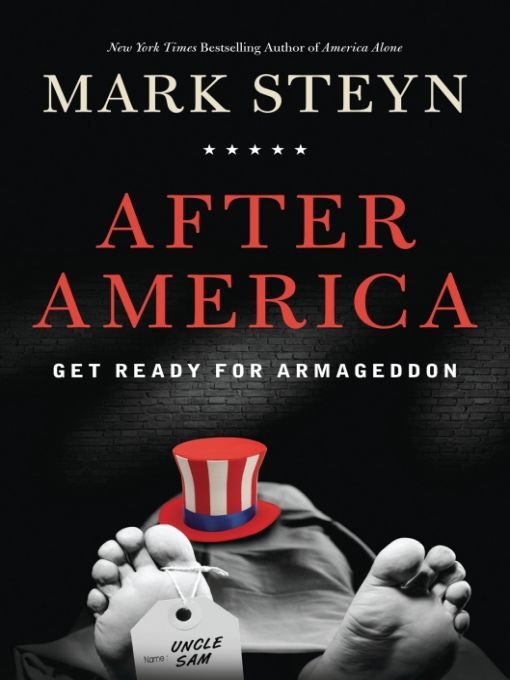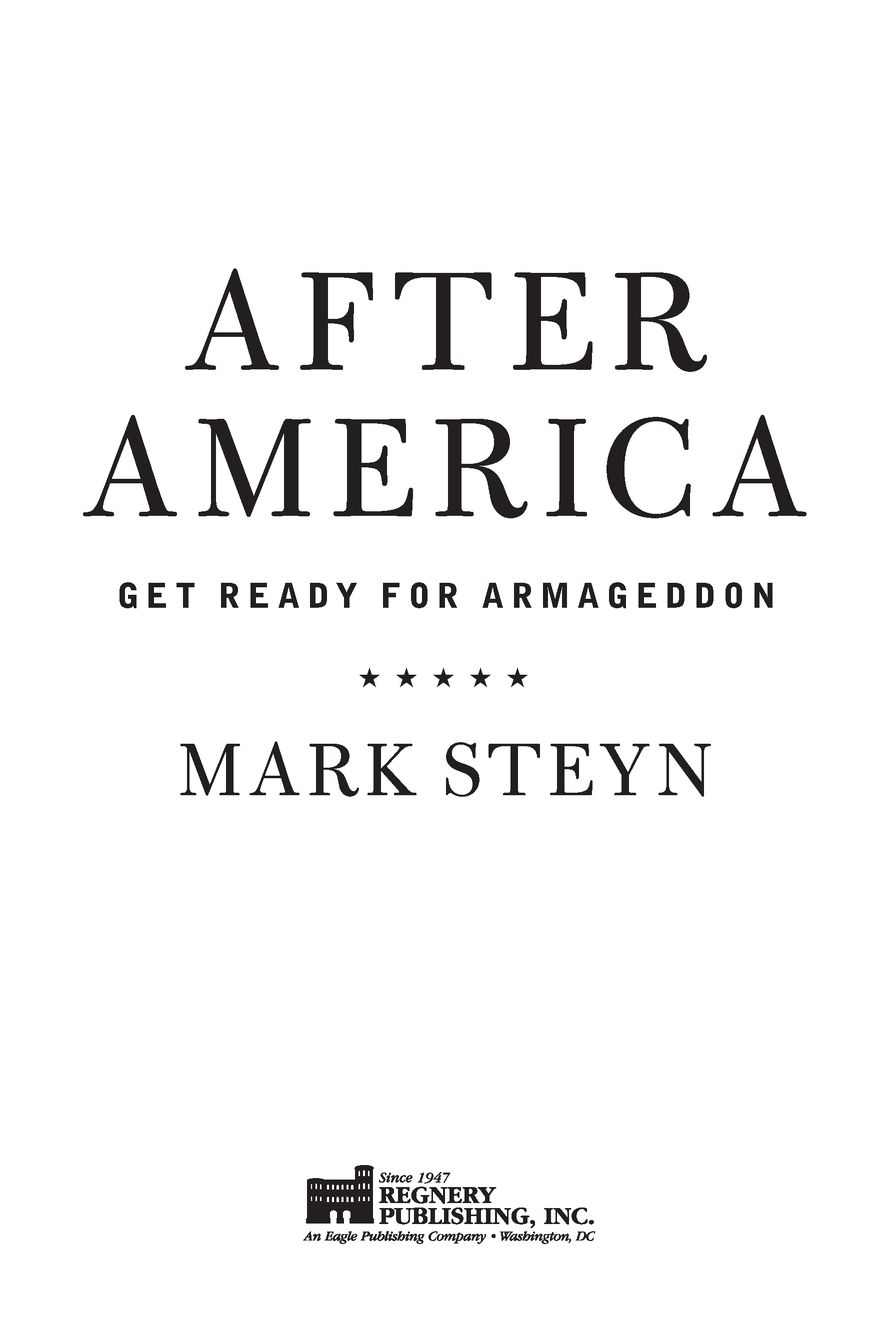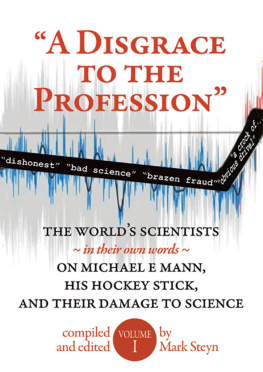Table of Contents
PROLOGUE
THE STUPIDITY OF BROKE
There is the moral of all human tales;
Tis but the same rehearsal of the past,
First Freedom, and then Glorywhen that fails,
Wealth, vice, corruptionbarbarism at last.
Lord Byron,Childe Harolds Pilgrimage(18121818)
The sunll come out tomorrow
Bet your bottom dollar
That tomorrow therell be sun
Charles Strouse and Martin Charnin,Annie(1977)
Previously on Apocalypse Soon ...
It was the worst of times, it was the not quite so worst of times.
The predecessor to this book was called America Alone: The End of the World as We Know It, and, given the title, you may be tempted to respond, Cmon, man. You told us last time it was the end of the world. Well, where the hell is it? I want my money back. Instead, you come breezing in with this seasons Armageddonouttahere routine. Its like Barbra Streisand farewell tourstherell be another along next summer.
Well, now: America Alone: The End of the World as We Know It was about the impending collapse of all of the western world except America.
The good news is that the end of the rest of the West is still on schedule.
The bad news is that America shows alarming signs of embracing the same fate, and then some.
Nobody writes a doomsday tome because they want it to come true. From an authors point of view, the apocalypse is not helpful: the bookstores get looted and the collapse of the banking system makes it harder to cash the royalty check. But Cassandras warnings were cursed to go unheeded, and so it seems are mine. Last time round, I wrote that Europe was facing a largely self-inflicted perfect storm that threatened the very existence of some of the oldest nation-states in the world. My warning proved so influential that America decided to sign up for the same program but supersized. Heigh-ho.
It starts with the money. In The Run Upon the Bankers (1720), Jonathan Swift wrote:
A baited banker thus desponds,
From his own hand foresees his fall,
They have his soul, who have his bonds;
Tis like the writing on the wall.
A lot of writing on the wall these days. Who has the bonds of a developed world developed to the point that its institutionally conditioned to living beyond its means? Foreigners with money. So whos available and flush enough? The Chinese Politburo; Saudi sheikhs lubricated with oil but with lavish worldwide ideological proselytizing to fund; Russian businessmen.... These are not the fellows one might choose to have ones bonds, never mind ones soul, but there arent a lot of other options.
So it starts with the moneydry stuff about numbers and percentage of GDP. As Senator Michael Bennet of Colorado fumed to a room of voters in 2010, We have managed to acquire $13 trillion of debt on our balance sheet. In my view, we have nothing to show for it.
Hes rightand $13 trillion is the lowest of lowball estimates. But why then did Senator Bennet vote for the stimulus and ObamaCare and all the other trillion-dollar binges his party blew through? Why did Senator Bennet string along and let the 111 th Congress (20092011) run up more debt than the first one hundred Congresses (17891989) combined? Panicked by pre-election polls into repudiating everything hed been doing for the previous two years, the senator left it mighty late to rediscover his virtue. You would think that Colorado voters might have remembered that, like Groucho Marx apropos Doris Day, they knew Michael Bennet before he was a virgin. Alas, an indulgent electorate permitted the suddenly abstemious spendaholic to squeak back into office.
And, contra Senator Bennet, eventually you do have something to show for it. It starts with the money, but it doesnt stop there. It ends with a ruined and reprimitivized planet, in fewer easy stages than you might expect.
Lets take a thought by the economist Herbert Stein:
If something cannot go on forever, it will stop.
This is a simple but profound observation. Dr. Stein first used it in the context of the long-ago debts and deficits of the Reagan era. The Federal debt cannot rise forever relative to the GNP. Our foreign debt cannot rise forever relative to the GNP, he said. But, of course, if they cant, they will stop. It was, as he later wrote, a response to those who think that if something cannot go on forever, steps must be taken to stop iteven to stop it at once. And he has a point: if something cant go on, you dont have to figure out a way to stop it, because its going to stop anyway.
Eventually.
As you might have noticed, since he first made the observation, the debt has gone on rising, very dramatically. But the truth is unarguable. If youre careening along a road toward a collapsed bridge, youll certainly stop, one way or the other. But it makes a difference, at least to you, whether you skid to a halt four yards before the cliff edge or whether you come to rest at the bottom of the ravine.
In 2010, Douglas Elmendorf, director of the Congressional Budget Office (CBO), described current U.S. deficits as unsustainable. On that everyones agreed. So lets make them even more so! On assuming office, President Obama assured us, with a straight face, that his grossly irresponsible wastrel of a predecessor had taken the federal budget on an eight-year joyride. So the only way his sober, fiscally prudent successor could get things under control was to grab the throttle and crank it up to what Mel Brooks in Spaceballs (which seems the appropriate comparison) called Ludicrous Speed. Lets head for the washed-out bridge, but at Obamacrous Speed!
The Spendballs plans of the Obama administration took the average Bush deficit for the years 20012008 and doubled it, all the way to 2020. Thats crazy. Obamas solution was to attempt to crank it up to 25 to 30 percent as a permanent feature of life. Thats load up the suicide-bomber underpants and pass me the matches.
The CBO doesnt put it quite like that. Musing on the likelihood of a sudden fiscal crisis, it murmurs blandly, The exact point at which such a crisis might occur for the United States is unknown, in part because the ratio of federal debt to GDP is climbing into unfamiliar territory.
But itll get real familiar real soon. A lot of the debate about Americas date with destiny has an airy-fairy beyond-the-blue-horizon mid-century quality, all to do with long-term trends and other remote indicators. In fact, well be lucky to make it through the short-term in sufficient shape to get finished off by the long-term. According to CBO projections, by 2055 interest payments on the debt will exceed federal revenues. But I dont think well need to worry about a Government of the United States at that stage. By 1788, Louis XVIs government in France was spending a mere 60 percent of revenues on debt service, and we know how that worked out for the House of Bourbon shortly thereafter.
So take your eye off the far prospect, and instead look about fourteen inches in front of your toecap. Within a decade, the United States will be spending more of the federal budget on its interest payments than on its military. You read that right: more on debt service than on the armed services. According to the CBOs 2010 long-term budget outlook, by 2020 the government will be paying between 15 and 20 percent of its revenues in debt interest. Whereas defense spending will be down to between 14 and 16 percent.













